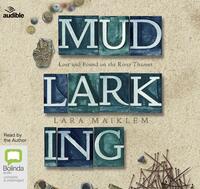You need to sign in or sign up before continuing.
Take a photo of a barcode or cover
Fascinating, imaginative, gently endearing look at the incredible jumble of history that is the River Thames, layered and packed in a similar style to the river itself with artifacts, historical facts and empathetic speculation about the past owners of the objects, and saturated with the author's personal passion for the whole process and way of thinking. The prose was clean to the point of being a bit dry for me at times, sometimes a bit repetitive of the themes, but only slightly. The subject is so incredibly rich and she does a good job blending her meandering overview and personal forays.
adventurous
informative
relaxing
slow-paced
Absolutely loved this book, and honestly the archaeological methods and facts are pretty well researched. Reminded me of all the treasures I found mudlarking along the Wear and those couple of days at the Thames.
informative
medium-paced
informative
inspiring
reflective
medium-paced
A nice balance between being informative and being a reflection on her own experiences. A lovely delve into the history of london and mudlarking. A gentle read. I'd recommend to people who like beach combing and history
Very enjoyable - lots of insight into mudlarking and the nature of amateur archeology mixed with lots of little nuggets of London history - lots of which was new to me, which is always exciting.
The history jumped around a lot as the chapters are sorted by geographical location, but I liked the approach as it became the specific history of different parts of the city - obviously the history and finds around the site of former royal residences vs historical docks vs the sites of former slums are very different.
I did feel like it took a very long time to read but that’s on me/i read it in January, the longest month.
The history jumped around a lot as the chapters are sorted by geographical location, but I liked the approach as it became the specific history of different parts of the city - obviously the history and finds around the site of former royal residences vs historical docks vs the sites of former slums are very different.
I did feel like it took a very long time to read but that’s on me/i read it in January, the longest month.
adventurous
informative
medium-paced
Fascinating book that I probably wouldn’t have chosen but I heard a chapter read by the author on the radio and was drawn in. The book is incredibly detailed explaining how much of our history is evidenced from the river. Sometimes it was a little too detailed as I lost track of the thread but overall an excellent read.
Fascinating read. This book reminded my that my first love is nonfiction.
Mailklem is an accomplished “Mudlark,” or one who walks the foreshore of the Thames and picks up bits of English history that surface, literally. From Roman pottery to 19th century glass eyes, Mudlarks encounter hundreds of years of garbage from the past that are considered treasures today.
Basically, humans who have lived along the Thames from the 100s AD to present day have made a practice of throwing their trash into the river. Old clay pipes from the 1600s, blue glass poison bottles, lead toys, and printing press letters make nicer trash than today’s plastic food containers and tampons, which also make their way into the Mudlarks’ paths. This begs the question: 2,000 years later, why are we still using water ways as garbage pits?
Mudlarking does seem magical, but I don’t think I would have the stomach to dig through the lardbergs and the facial wipes to get to the real trash—er, I mean, treasure.
Mailklem is an accomplished “Mudlark,” or one who walks the foreshore of the Thames and picks up bits of English history that surface, literally. From Roman pottery to 19th century glass eyes, Mudlarks encounter hundreds of years of garbage from the past that are considered treasures today.
Basically, humans who have lived along the Thames from the 100s AD to present day have made a practice of throwing their trash into the river. Old clay pipes from the 1600s, blue glass poison bottles, lead toys, and printing press letters make nicer trash than today’s plastic food containers and tampons, which also make their way into the Mudlarks’ paths. This begs the question: 2,000 years later, why are we still using water ways as garbage pits?
Mudlarking does seem magical, but I don’t think I would have the stomach to dig through the lardbergs and the facial wipes to get to the real trash—er, I mean, treasure.




